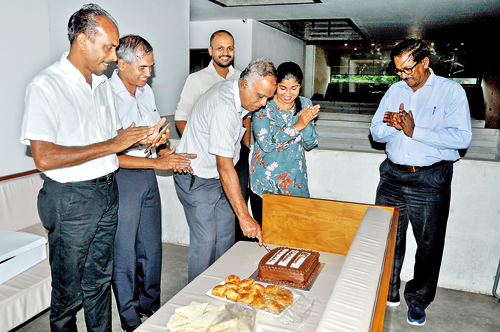Turning back the pages of a 60-year-old story

Celebrating 60 years: The committee
There is cause for celebration for Sri Lanka’s oldest association in the book trade, as they commemorate an important milestone in their long and fruitful history as a group.
The Ceylon Booksellers Importers & Exporters Association celebrated 60 years on November 28 this year, having been in existence since 1958 when booksellers of this country made the pioneering effort to form an association to address issues, meet the growing requirement from the reading public, and to stand together to have their voices heard by the government.
The need for this kind of group effort was paramount, as they faced many difficulties in keeping their trade flourishing at a time where the then government practised a closed economy as an effort to be self-sufficient.
In came heavy import taxes and import restrictions, particularly in the 60s and early 70s in the form of the strict exchange control system known as foreign exchange entitlement certificates (FEECs), which essentially cut off booksellers from importing items. Many members faced legal actions just trying to survive.
Though the stringent restrictions are a thing of the past, the issue of taxation still comes up at nearly every meeting. The committee meets every month without fail to resolve such issues – a monumental effort considering how busy each member is with their respective businesses.
But as former president Miles Brohier puts it- “Certain things we can’t delay. Decisions need to be taken.” He recalls that in the eight years of his presidency, they only postponed a meeting once.
This speaks volumes about the dedication of the Association to protect the interests of their members as well as the reading public. One such example of this is when the Association successfully campaigned to remove taxes on books, following an agreement by UNESCO to treat books as cultural products and make them available tax free. Former President C. Gnanasekara recalls what an effort it was, and was only achieved through the patient lobbying of the Association.
“We don’t want books to be distant from the reader. We want these to be affordable,” Miles says, to enthusiastic assent from the committee members.
The Association prides itself on being one of the most transparent trades operating here. Prices are never hidden, even on imported books, and the original foreign price is printed right next to the local one in most cases.
Neither do they increase their prices for the sake of it. In fact, if the foreign exchange situation is favourable, they work to reduce the prices – something that no other trade does. It is done voluntarily, where the decision is taken as a community and communicated to all members.
In an age of online shopping, it is worth remembering that not everything you find online is necessarily cheaper. In this case, books are imported at a price point that is affordable to this market, and are even further discounted at Book Fairs and other such exhibitions.
Not only does South Asia have their own lowered pricing points, but most of the reputed international publishers have allowed Indian publishers to reprint their products or they have branches. Those are comparatively much cheaper than the original publications, and the Association makes it a point to pass on the concessions that it gets.
The Association celebrated another milestone this year–20 years of involvement in the Colombo International Book Fair, which was in turn created after the association’s own efforts at staging book exhibitions.
The association has a long and varied history of participating in book fairs globally, in an effort to promote the local book trade– its earliest exhibit at the Frankfurt Book Fair and the Moscow Book Fair (now defunct after the collapse of the USSR) during the Cold War, to the more recent participation in the London Book Fair twice in collaboration with the Export Development Board, and the World Book Fair in New Delhi.
It is due to these efforts that there is a demand for Sri Lankan books globally, from university libraries that stock Sri Lankan literature, to foreign countries with large Sri Lankan communities. While 70%-80% of books imported to this country are for educational purposes, the most popular exports are concerning Sri Lankan culture, heritage, translations of local folklore, Buddhism, cookery and such.
The Association is also responsible for conducting training programmes for its members on customer service, bookselling and related activities, and has collaborated with the British Council and the National Library and Documentation Services Board. Collaborations with other associations are a hallmark of the Association’s efforts to ensure progress.
Another significant difference is the committee strives to stay fresh, with the older members happy to take a back seat and nominate the younger members for the important positions in order to facilitate new and better ideas. This year saw the appointment of the Association’s first female president – former treasurer Dinushi Abeywickrama, who recalls feeling “greatly honoured” at the opportunity.
In complete collaboration with the rest of the committee, Dinushi is already implementing new ideas and strategies to keep the book trade flourishing.
The list of projects that they undertake is constantly being updated, including the issue of tackling book piracy online and foreign interference from sellers who sell remainders – unsold stocks that publishers don’t have the storage for – at marked up prices under the guise of heavy discounts.
The Association has seen countless changes in its day, including three name changes – from their original Booksellers Association of Ceylon, to Booksellers & Importers Association of Ceylon, to the most recent change in August 2011 to the Ceylon Booksellers Importers & Exporters Association.


